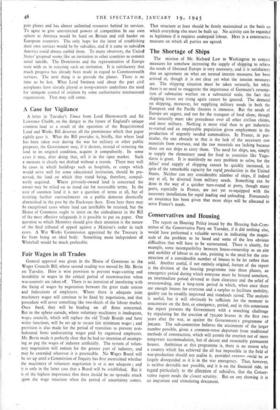Fair Wages in all Trades
General approval was given in the House of Commons to the Wages Councils Bill, whose second reading was moved by Mr. Bevin on Tuesday. Here is wise provision to prevent wage-cutting and instability in wages in the critical period of reconstruction when war-controls are taken off. There is no intention of interfering with the fixing of wages by negotiation between the great trade unions and federations of employers. Where there is adequate joint machinery wages will continue to be fixed by negotiation, and that procedure will cover something like two-thirds of the labour market. Once fixed, they will be binding on all firms concerned. But in the sphere outside, where voluntary machinery is inadequate, wages councils, which will replace the old Trade Boards and have wider functions, will be set up to secure fair minimum wages ; and provision is also made for the period of transition to prevent non- federated firms undercutting wages paid by organised employers. Mr. Bevin made it perfectly clear that he had no intention of attempt- ing to peg the wages of industry artificially. The system of volun- tary negotiation will remain for the greater part of industry, and may be extended wherever it is practicable. No Wages Board will be set up until a Commission of Inquiry has first ascertained whether the machinery of voluntary negotiation is or is not adequate ; and it is only in the latter case that a Board will be established. But it is of the highest importance that there shot'. Id be no sporadic attack upon the wage structure when the period of uncertainty comes. That structure at least should be firmly maintained as the basis on which everything else must be built up. No activity can be regarded as legitimate if it requires underpaid labour. Here is a constructive measure on which all parties are agreed.


























 Previous page
Previous page